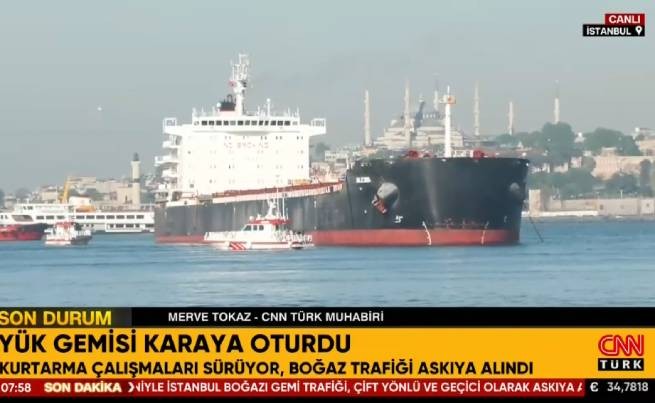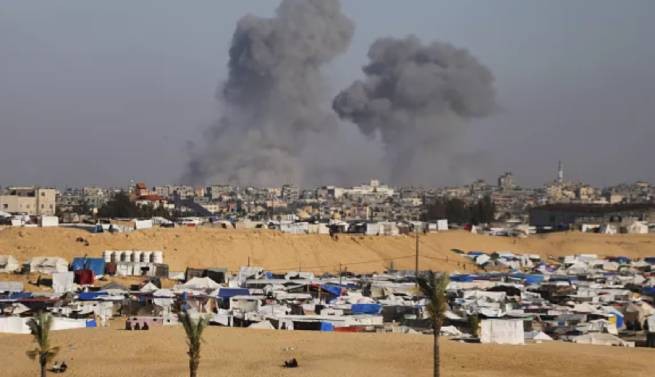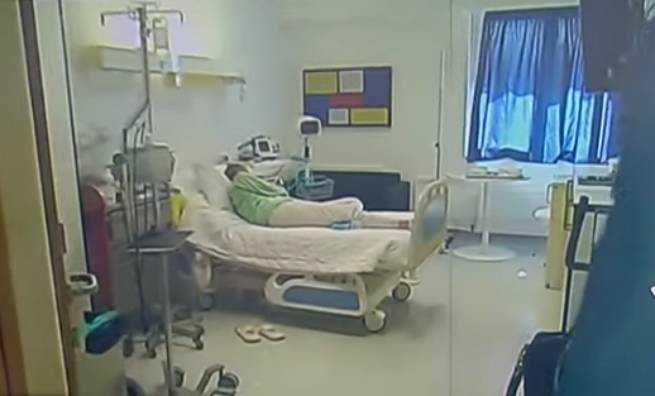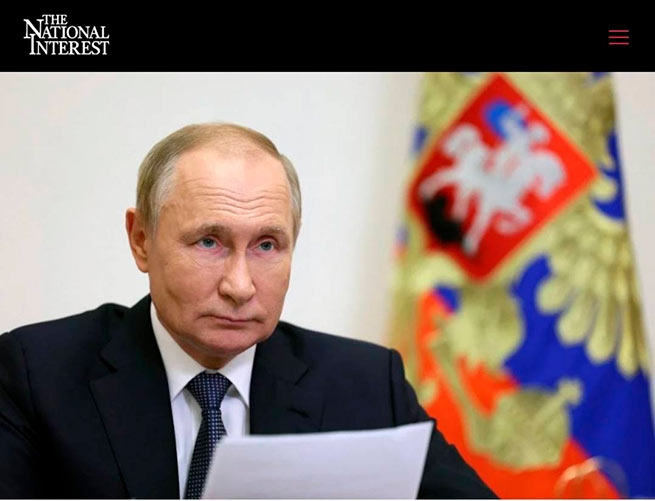A series of media strikes in the Western press on Ukraine continues. Today The National Interest distinguished itself: “It is not in the interests of the United States for Russia to be in the arms of China.”
By far the best strategy is, if possible, to coax Putin (or his successor), with his weakened forces and economy, into negotiating a tolerable settlement and provide him with clear benefits to do so. Among these benefits are a return to global trade, an end to sanctions, and – unlike the end of the Cold War – a treatment of Russia as the world power that it is, rather than a return to the humiliation it experienced in the 1990s. Instead of “no relationship at all,” Russia – with or without Putin – should be integrated as far as possible into the European family, not as a subject seeking patience from superiors, but as an equal member. All this does not require restraint in supporting Ukraine now or restraint in response to Russia’s barbaric aggression. It only requires that carrots, not just sticks, be available in the process, and that NATO allies remember that the goal is to improve, not worsen, the status quo. The National Interest.
***
Gerald F. Hyman
At a recent event, when asked what his country’s possible plans are or will be with Russia after the end of the conflict between it and Ukraine, a senior member of parliament from one of the NATO countries and a political party official replied: “None. At least as long as Putin remains at the helm. This would be a serious mistake, not only because of Russia’s inherent idiosyncrasies, but also because of its relations with other countries, especially (but not only) China. NATO allies and Ukraine itself need to find an acceptable plan for dealing with Russia after the war.
The palpable fury at the Kremlin on the part of Ukraine and NATO allies is shaping their policy toward Russia. We have not seen such a deliberate, deliberate, indiscriminate barbaric attack, turning entire regions and cities, hospitals, schools, kindergartens, houses and power plants into ruins and concrete cemeteries since the Wehrmacht attacked Poland and the Soviet Union.
President Volodymyr Zelensky set a clear Ukrainian goal: “We will stop only when we return our country to the 1991 borders. We will return the Ukrainian flag to every corner of Ukraine.” This understandable ambition is almost certainly beyond the reach of Ukraine. However, Russia is also unlikely to achieve Vladimir Putin’s goal of destroying Ukraine’s independence, decapitating its government, re-occupying all or almost all of the country and absorbing it into a greater Russia. At present, it seems unlikely even to return the entire Donbass. Short of resorting to using its tactical nuclear arsenal, it has no military resources – troops, equipment, ammunition, leadership, strategy, or the will to do so. However, neither side is (yet) willing to agree to a ceasefire that, like in World War I, would put both sides indefinitely in the trenches that occupy half of the Donbass.
Zelensky rightly noted that 2023 is a key year for achieving Ukraine’s goal. Ukrainian forces should be able to turn the tide this year and make significant gains by driving out Russian forces in the east and south. If they fail to do so, then the course of the war will most likely turn not in their favor, but in favor of Russia, or the war will end in a stalemate. The Ukrainian people cannot resist the devastation that has befallen them indefinitely. Their amazing prowess, resilience and granite resistance cannot last indefinitely, neither can their own assets or the economic, political and military support of allied countries. All this does not portend a Russian victory – it only means that at least part of the Donbass and probably most, if not all of Crimea, will remain in Russian hands. This means that the de jure borders will sooner or later come into line with the de facto reality. Ukraine’s allies will need to work with Kiev to develop and support a realistic strategy until 2023, and preferably a victory acceptable to and achievable by the Ukrainians.
Yet, despite NATO’s outrage at Russian aggression and atrocities, international ostracism is not a sound recipe for a relationship, especially for a country as large and important as Russia once the senseless carnage has ended or subsided. True public administration requires a keen eye for long-term and short-term policy. Russia will not disappear, although Putin may.
If anger and hostility become the hallmarks of NATO policy towards Russia, the result will be a line of hostility from the Barents Sea, along the eastern borders of Norway, Finland, Estonia, Latvia and Ukraine to the Black Sea and, depending on Turkey’s position, possibly to The Mediterranean Sea is, in fact, a re-creation of the Cold War 450 miles to the east. This would mark a frontier of hostility between entire civilizations, each with vast armies and economies, and nuclear weapons capable of reducing each other to fragmented (and now radioactive) wreckage. The celebration of the end of the last Cold War three decades ago and its replacement by peace, however shaky and conditional, will be reversed. Of course, this may not be the only or even better option.
Justified anger towards Russia cannot obscure from politicians what it really is: a vast country with vast human and natural resources; a federation of republics, the largest country in the world, spanning eleven time zones – indeed, a sort of empire in itself. Moreover, it has a long history and a commensurate sense of being a great power in Eurasia, with an imperial record spanning three centuries. It has a very sizable military, although it is now severely depleted, and it has nuclear weapons and delivery systems that can destroy an adversary, even if Russia itself is destroyed in the process. Moreover, even if Russia could be excluded from the West, it cannot be isolated from the rest of the world, and while it will pay a huge price if it is isolated by the West, countries trying to isolate it will also pay no less.
Finally, it cannot be in the interests of the United States that Russia find itself in the arms of China, and thus we are faced with two colossi in one person. Russia is not some sparsely populated atoll in the Pacific, and it would be both reckless, arrogant, and even self-defeating to try to treat it as such.
By far the best strategy is, if possible, to coax Putin (or his successor), with his weakened forces and economy, into negotiating a tolerable settlement and provide him with clear benefits to do so. Among these benefits are a return to global trade, an end to sanctions, and – unlike the end of the Cold War – a treatment of Russia as the world power that it is, rather than a return to the humiliation it experienced in the 1990s. Instead of “no relationship at all,” Russia – with or without Putin – should be integrated as far as possible into the European family, not as a subject seeking patience from superiors, but as an equal member. All this does not require restraint in supporting Ukraine now or restraint in response to Russia’s barbaric aggression. It only requires that carrots, not just sticks, be available in the process, and that NATO allies remember that the goal is to improve, not worsen, the status quo.
The opinion of the author may not coincide with the opinion of the editors.
Gerald F. (“Jerry”) Hyman has been Senior Advisor to the Center for Strategic and International Studies since 2007. He held several positions with USAID from 1990 to 2007, including Director of its Office of Democracy and Governance from 2002 to 2007. Author of a large number of publications.
Translation by Pavel Onoyko.







More Stories
Financial Times: Russia is actively preparing sabotage in Europe
Shock: Drag queen will carry the Olympic flame in Paris
Greece consistently ranks last in the EU for media freedom